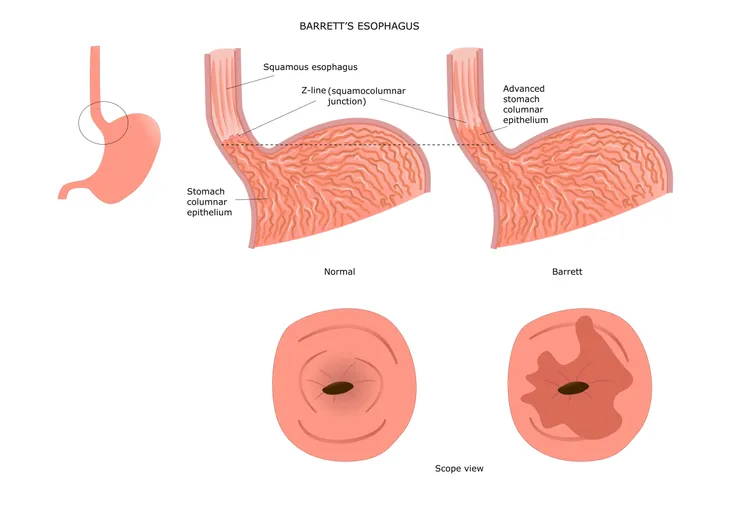Being diagnosed with any type of cancer is scary and life-altering. Even if you’re very likely to fully recover and live a long, healthy life, the emotional and physical toll of dealing with cancer and any associated treatments is exhausting. When it comes to esophageal cancer, many warning signs begin early on and may not seem like a big deal at the time, but it’s important to know your body and be able to recognize any changes it goes through. It could save a lot of pain and suffering in the future—or even save your life.
While there are several early and subtle warning signs of esophageal cancer, many of them can be caused by other conditions. Please don’t assume you have esophageal cancer, but it doesn’t hurt to be proactive and see your doctor if you’re experiencing several of these 15 signs…
1. Unexpected Weight Loss
There are many causes of unexpected weight loss—weight loss when you aren’t doing anything specific or trying to lose weight—and esophageal cancer is one of them. There are a few reasons people experience weight loss from it, including difficulty swallowing, which forces you to eat less. It can also be from the cancer speeding up your metabolism, something some health experts believe can happen. Either way, unexpected weight loss should not be ignored because of the possible causes.
Of course, if you’ve recently begun a new diet, have been making new, healthy lifestyle choices, or are working out regularly or more intensely, odds are the weight loss is from one of those changes. But if you have dropped weight from doing nothing different, something might be up with your body and it’s worth getting checked out. Even if it’s not esophageal cancer, it could be another medical condition. Catching anything early on is pretty much always better than once the disease or condition has already progressed.
2. Minor Difficulty Swallowing
Unfortunately, most of the signs and symptoms of esophageal cancer occur when the disease has already advanced, but you might find it sooner if you pay close attention. Difficulty swallowing is one of the most common signs to look for, yet many don’t notice any changes in swallowing because it builds up slowly. You might unknowingly start eating softer foods and chewing solid foods longer in order to get it down. Eventually it gets to the point where you have trouble swallowing all foods.
Food feels like it gets stuck and could cause you to choke. But for this sign, you need to notice difficulty swallowing when it’s very minor—once you get to the stage where you can barely swallow food and depend on liquid nutrition, the disease is much more advanced. The difficulty swallowing is from the cancer growing, causing the opening of the esophagus to get narrower until you can’t swallow food or even liquids. Knowing that difficulty swallowing can be a sign of esophageal cancer could help you identify small changes early on, resulting in an early diagnosis.
3. Chronic Heartburn
Although a significant number of people experience heartburn, chronic heartburn that lasts for several weeks could be cause for concern, especially if you notice other symptoms along with it. Heartburn and acid reflux are closely related—the burn you feel in your chest is from acid reflux, a condition that allows stomach acid to get in the esophagus. Regardless of the cause of your heartburn, it’s something that needs to be managed through treatment. In reference to oesophageal cancer, we’re talking about chronic heartburn, not heartburn that lasts a few hours or a few days.
Chronic heartburn is an early warning sign of esophageal cancer, but it can also cause it. And there are actually quite a few other serious conditions it can cause or be a sign of. Because of this, it’s not something you should ignore. See your doctor if you experience heartburn regularly so you can treat it and start monitoring any changes in the length of time and severity of heartburn. Treatment can help prevent serious diseases, and if it is a precursor to esophageal cancer, you could detect it earlier than later.
4. Chest Pain
Chest pain can be caused by tons of diseases, cancers, and other medical conditions, and is a warning sign of esophageal cancer. The chest pain associated with this cancer doesn’t necessarily happen during or after eating. Since your esophagus goes down the chest to the stomach, any cancer behind the breastbone can be the cause of chest pain. Tumors can lead to spasms in the esophagus, resulting in another type of pain. It can also feel like the pain goes right through to your back, something that’s discussed later in the article.
Chest pain is frightening, especially the first time it happens. But in reality, you’re likely going to experience it at some point in your life, though that doesn’t mean you have something serious or deadly. That said, no chest pain, even if it ends up being a bad case of heartburn, should be ignored. Be aware of your body and any changes to it or new pain symptoms—it could help identify a serious condition if you do so.
5. Chronic Cough
A lingering cough that lasts for more than a month or so is a subtle yet very real early warning sign of esophageal cancer. Chronic cough, especially after you swallow something, should be checked out by your doctor—or they should at least be made aware of the issue so they can keep an eye on it, as well as tell you what other signs to be aware of (based on a variety of possible conditions, including esophageal cancer). Depending on other symptoms, your doctor may be able to provide a medication or order tests to look into it further if they believe there’s cause for concern.
The cough you endure as a result of esophageal cancer is actually from the acid reflux many people with the cancer experience, like a constant itch and burn that makes you cough. If you have a lingering cough but haven’t felt sick or had a virus recently, it isn’t normal and shouldn’t be ignored. It doesn’t mean you have something serious such as esophageal cancer, but it is a warning sign and you’ll want to rule out anything serious if the cough continues.
6. Back and Throat Pain
It’s amazing—but not in a positive way—how certain illnesses can affect areas of your body you don’t think could be related. And because of this, many times people ignore a symptom, because they don’t think it could be serious and don’t bother telling their doctor about it. Such is the case with back pain from esophageal cancer. The fact is, some people with esophageal cancer experience back pain but won’t feel severe pain until the disease progresses, so pay attention to minor, unexplained pain that doesn’t go away.
Throat pain is a little easier to understand, because it’s caused by acid reflux, another common symptom and sometimes cause of esophageal cancer. While it’s tempting to self-diagnose a problem when you have symptoms that could be a result of hundreds of different medical conditions, don’t. Just be mindful of any changes you notice in your body and keep track of whether you’re experiencing more than one symptom on this list, instead of just one.
7. Regurgitating Food
Food that comes back up (but isn’t necessarily from vomiting) is quite an unpleasant sign of esophageal cancer. Regurgitation happens because the food can’t travel all the way to your stomach due to the cancer’s effect on the esophagus. Tumors could be in the way and the “tunnel” to your stomach gets smaller as the cancer progresses, causing regurgitation. The food won’t be digested at all because it never made it to the final destination. This can cause unintentional weight loss, another sign of esophageal cancer.
Some people might also notice there’s excess saliva that they can’t get down. In order to swallow food, your body produces saliva to help the food slide smoothly. When the esophagus is narrow from the cancer, the saliva that can’t get through to your stomach ends up coming back up. Many people with this cancer experience regurgitating saliva, as well as thick mucus that travels up and into their mouth.
8. Hoarse Voice
Those who have experienced moderate to severe acid reflux over a long period of time might have ended up with a hoarse voice. Although hoarseness usually occurs once the cancer has advanced, the subtle tickle, scratch, or burn could be an early warning sign—and it may eventually lead to a hoarse voice. It’s important to catch this early on because a hoarse voice from esophageal cancer usually begins after several other symptoms are present. Some of these symptoms include frequent hiccups, coughing up blood, and throat pain.
When there’s many symptoms, there’s a good chance the cancer has progressed and medical attention is needed as soon as possible. Since esophageal cancer is difficult to detect at an early stage—and it’s certainly not the only cancer or disease that has few early signs—knowing your body and paying attention to changes is vital to increase the chance of survival if you’re diagnosed with something life-threatening. Serious and chronic acid reflux should be managed and checked by your doctor to ensure it doesn’t cause or is a sign of cancer.
9. Fatigue
Any serious disease takes a toll on your body, and not just in the area that’s affected. Regularly feeling tired and fatigued is a common warning sign of cancer, including esophageal cancer. You could feel a drain on your physical energy and that regular, everyday tasks are difficult and take a lot of energy to complete. In some cases, if a patient becomes anemic because of a cancer, it can increase fatigue and make them feel tired when doing just about anything.
Unfortunately, fatigue only worsens as cancer progresses. And going through cancer treatments can add to the exhaustion, as the treatments impact the whole body. While fatigue can be a warning sign, it’s really only the beginning if the esophageal cancer is advanced. The mental and emotional toll is extremely tiring, which can make other side effects of treatment feel worse and challenge your ability to cope. The best thing is to see your doctor if you experience abnormal symptoms, even if you’re just feeling tired.
10. Barrett’s Esophagus
Barrett’s esophagus is thought by some experts to be the first warning sign of esophageal cancer—although it’s important to note that having Barrett’s esophagus does not mean you’re bound to develop esophageal cancer. What makes this condition a warning sign is that you’re at an increased risk when you have it. According to the Mayo Clinic, Barrett’s esophagus is a condition that causes tissue in the esophagus to be replaced with the wrong type of tissue. But what’s interesting is the condition doesn’t typically cause any symptoms.
Something that can cause Barrett’s esophagus is gastroesophageal reflux disease (GERD), and many people who end up developing esophageal cancer have both of these conditions. GERD is just another connection that could increase your risk of cancer. So know your family history, and if you’re told you have Barrett’s esophagus, keep a diligent eye on any of these early and subtle warning signs. Knowledge is the best prevention.
11. Pain When Swallowing Food
This one is very similar to our previous slide on difficulty swallowing food, but the emphasis here is on the pain. It doesn’t happen to every person who develops esophageal cancer, but VeryWell Health says it occurs in about 20-percent of people. “The pain may be felt within a few moments of swallowing when the food or liquids reach the tumor and can’t pass,” writes the source. It could also be due to any open sores in the lining of the esophagus or if it “invades the surrounding tissues.”
Another uncomfortable side effect of painful swallowing is pain between the shoulder blades, in the back, and throughout the chest.
12. Hiccups
We all experience hiccups from time to time, and while they can be pretty annoying or embarrassing, they usually don’t last long and don’t occur frequently. Someone with esophageal cancer might experience hiccups on a regular basis. According to Sunrise Children’s Hospital, an unusual warning sign of esophageal cancer is hiccups. These will occur as the cancer spreads into the chest and presses on the nerve that stimulates hiccups.
VeryWell Health expands on the subject and writes, “Hiccups may occur when an esophageal tumor invades the phrenic nerve or diaphragm. Irritation of these structures causes these repeated contractions of the diaphragm.”
13. Black Stools
Although it’s uncomfortable to talk about, let’s just admit it right off the bat, we all notice when something is off with our bowel movements. This can be a really good indication of whether something is wrong with our health. Even something as minor as eating a strange or expired food will throw our digestive system through a loop. This is the same for more serious conditions like cancer. When there’s blood in our stool, it turns them dark and tarry looking. It can be scary to see blood in the stool or what seems like dried up blood, because it means there’s bleeding somewhere in the body.
The American Cancer Society says that, when it comes to esophageal cancer, the bleeding is usually from the esophagus. The source writes, “This blood then passes through the digestive tract, which may turn the stool black. Over time, this blood loss can lead to anemia (low red blood cell levels), which can make a person feel tired.”
14. Excess Saliva
As we previously mentioned, people who are suffering from esophageal cancer will experience difficulty swallowing their food. This occurs either because the esophagus becomes more narrow due to the tumor or it’s taking longer for the food to move down the esophagus, getting stuck, or just more painful. No matter what their experience is, for the most part, people with this type of cancer will have some kind of difficulty. As a result, their body will begin producing more saliva to help encourage food to pass down the throat.
15. Rare Symptoms
Just like anything else to do with the body, everyone’s a little different. Patients who suffer from esophageal cancer will most likely experience the symptoms we’ve already listed, but there have been cases where people also experience any of the following symptoms. It usually depends on how far the cancer has progressed and whether it has spread into nearby tissues or other regions of the body.
Some of the more rare symptoms of esophageal cancer are shortness of breath, which can occur if the tumor spreads into the chest and causes aspiration or pneumonia. A patient might also notice their lymph nodes are swollen. According to VeryWell Health, this can occur in either the supraclavicular nodes which are just above the collarbone or the neck, also known as the cervical lymph nodes. The same source also lists tenderness over bones and back pain as possible “rare symptoms.” Back pain will occur if the tumor is located between the lungs or membranes that line the heart, while tenderness over the bones happens when the cancer spreads to the bones.


















